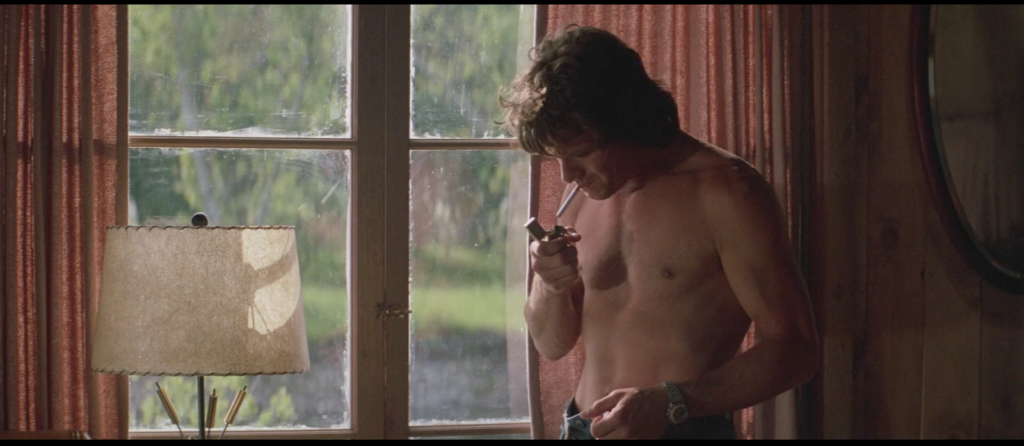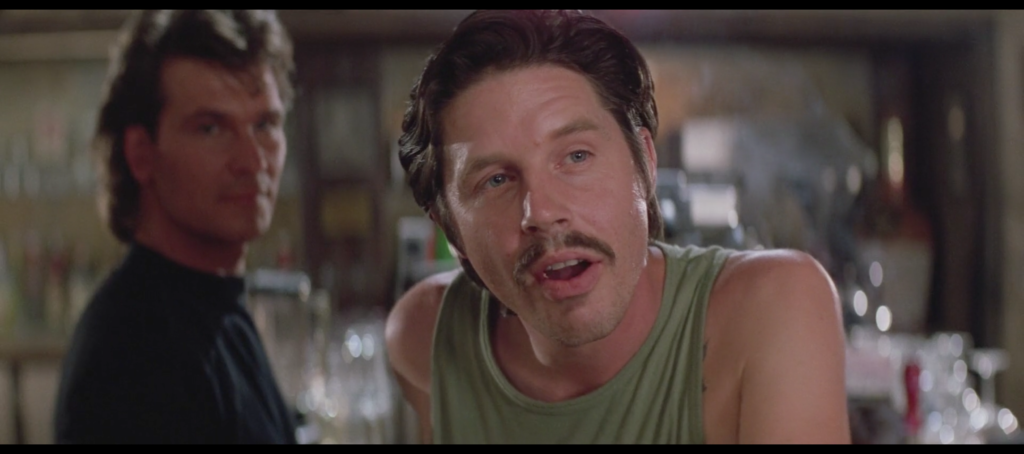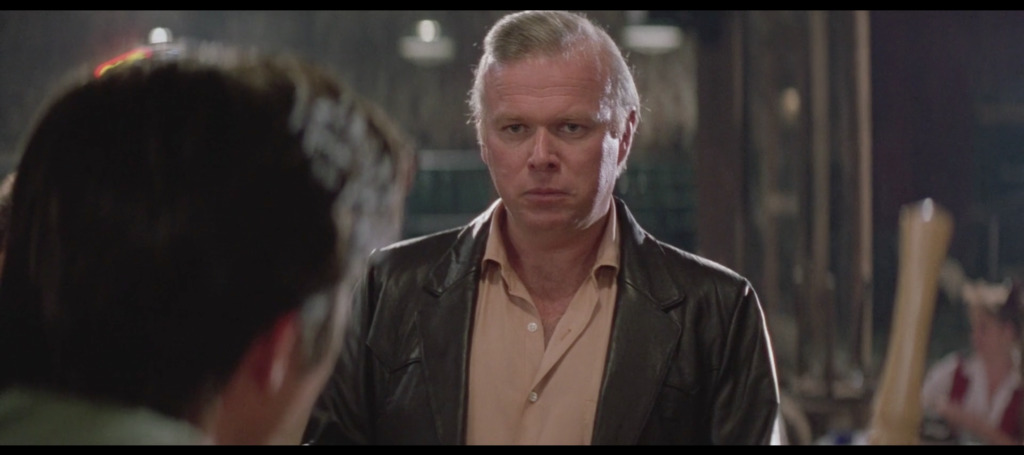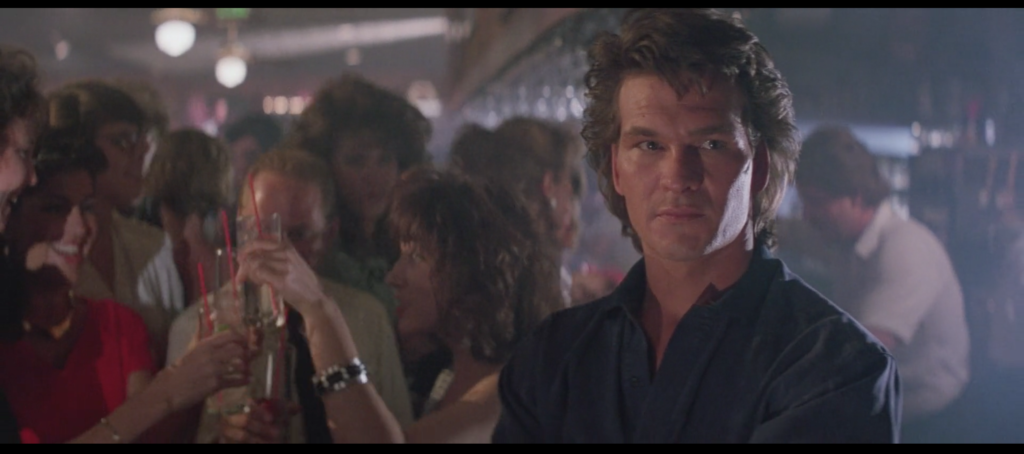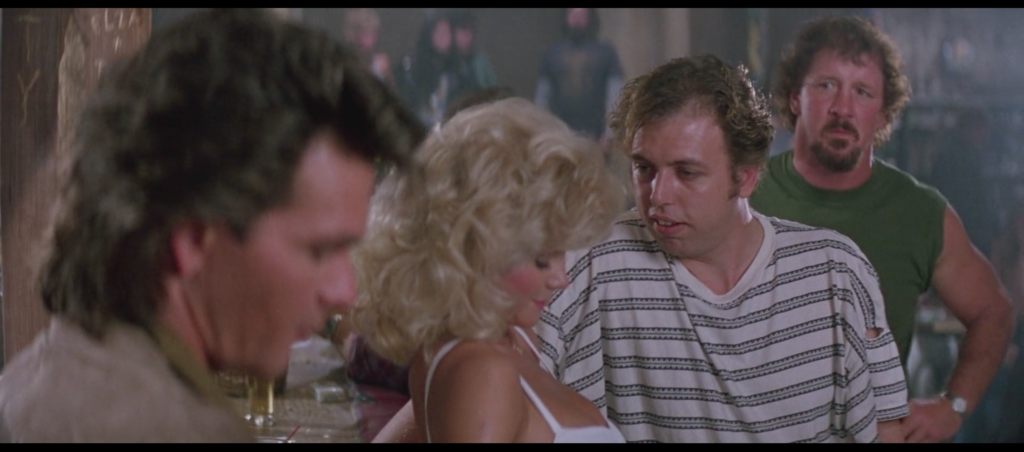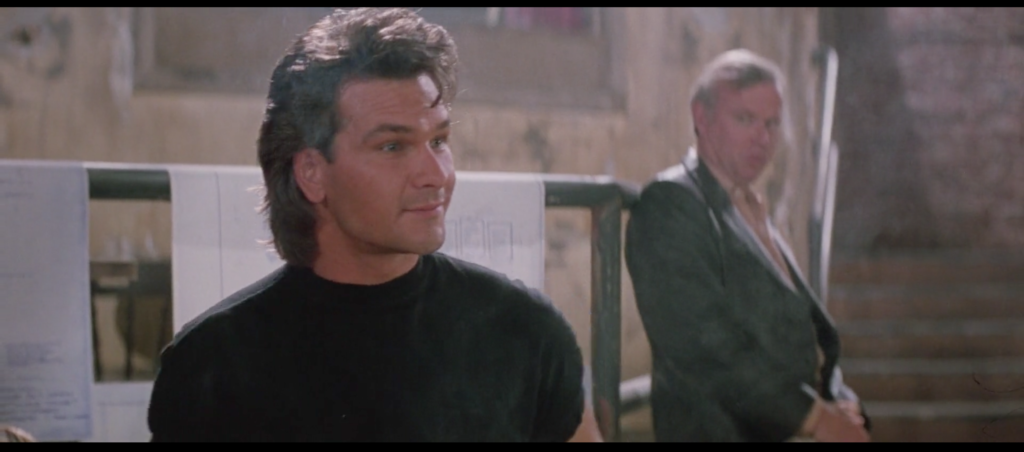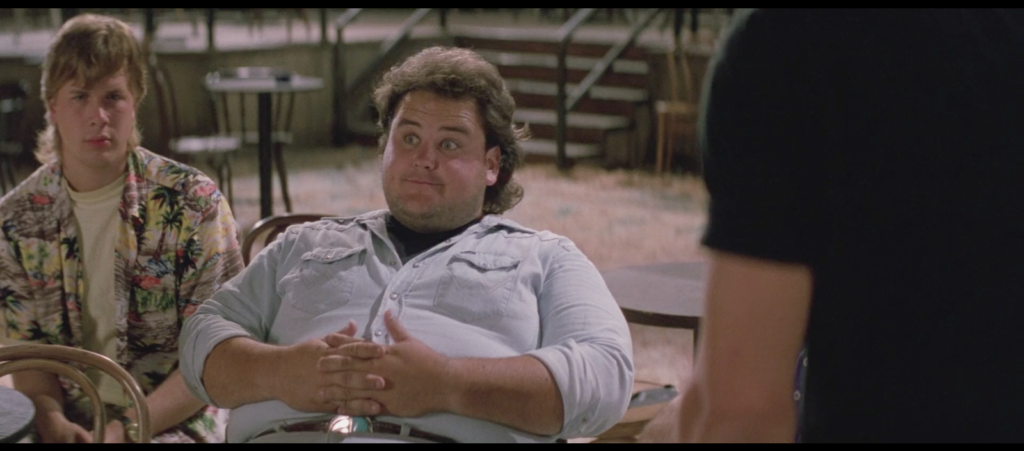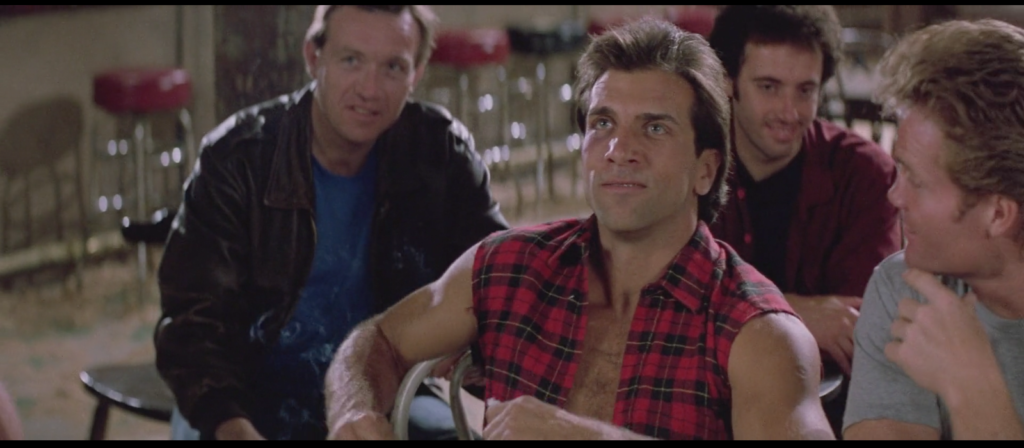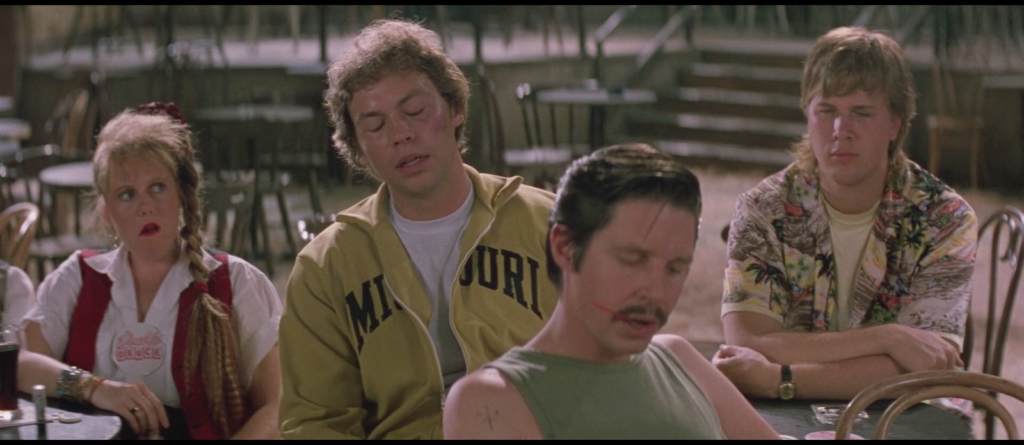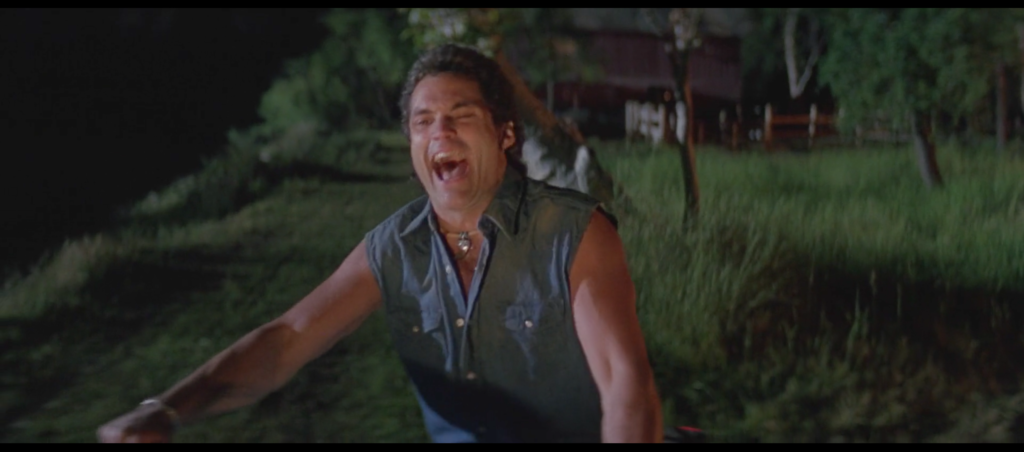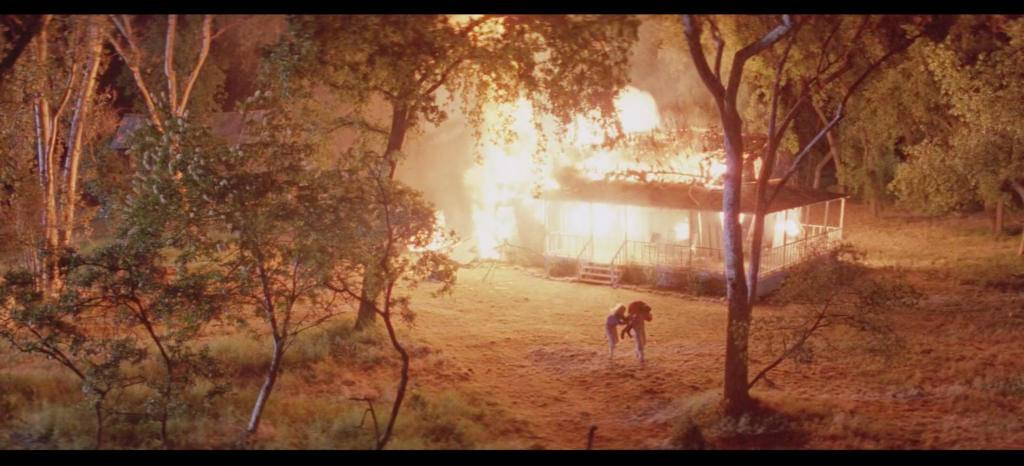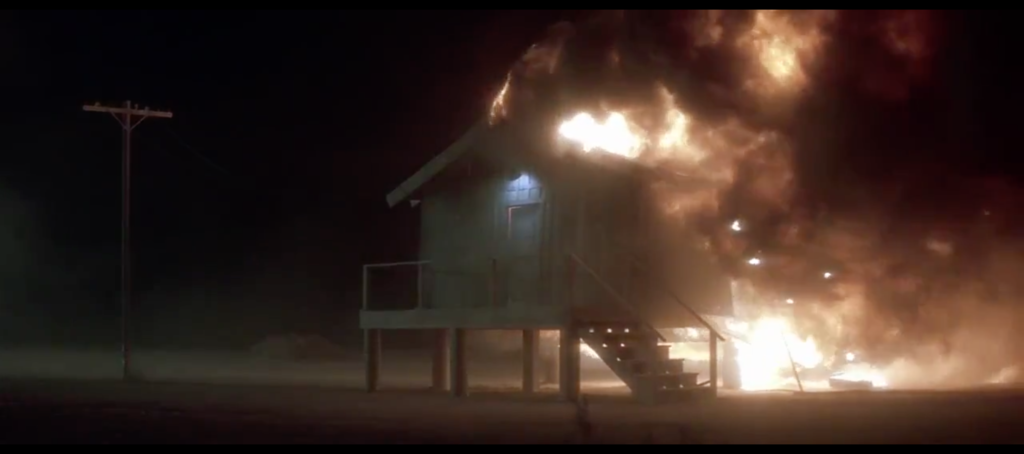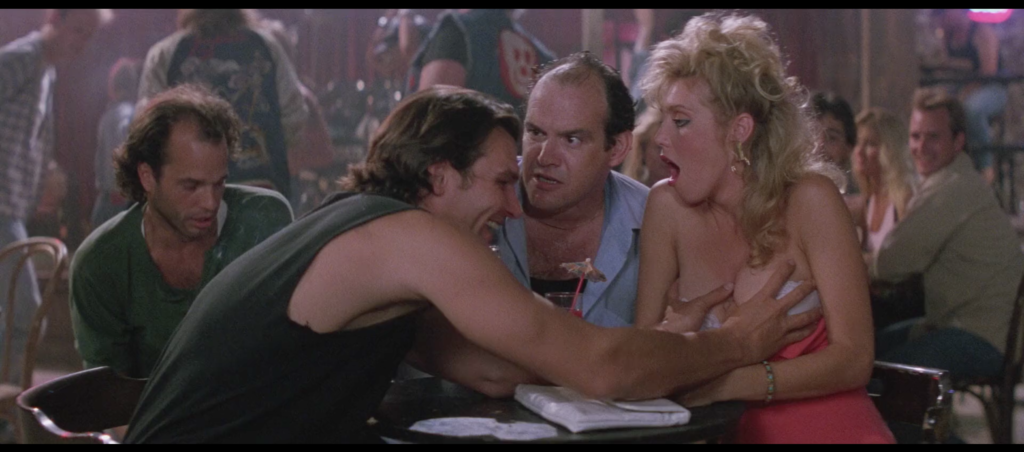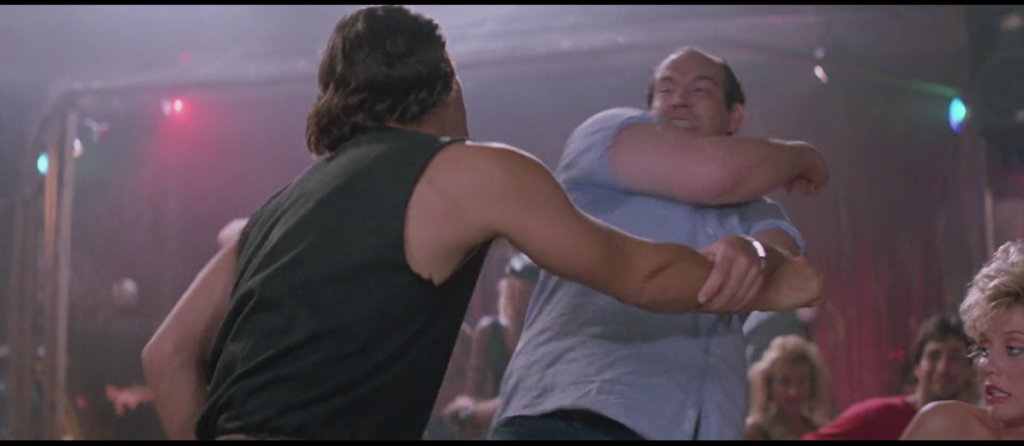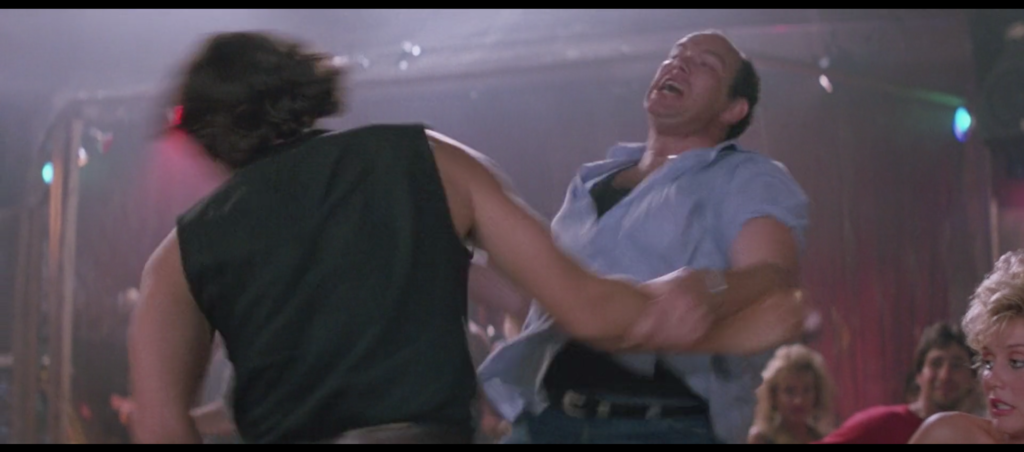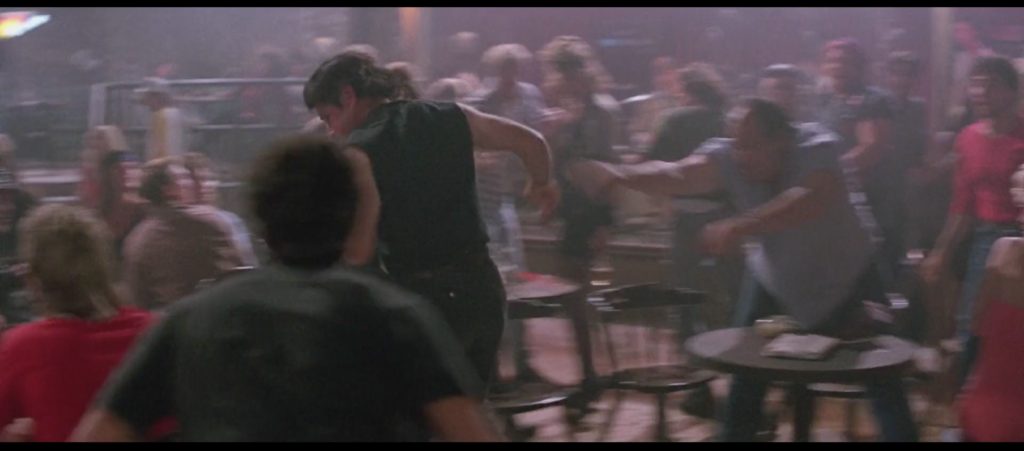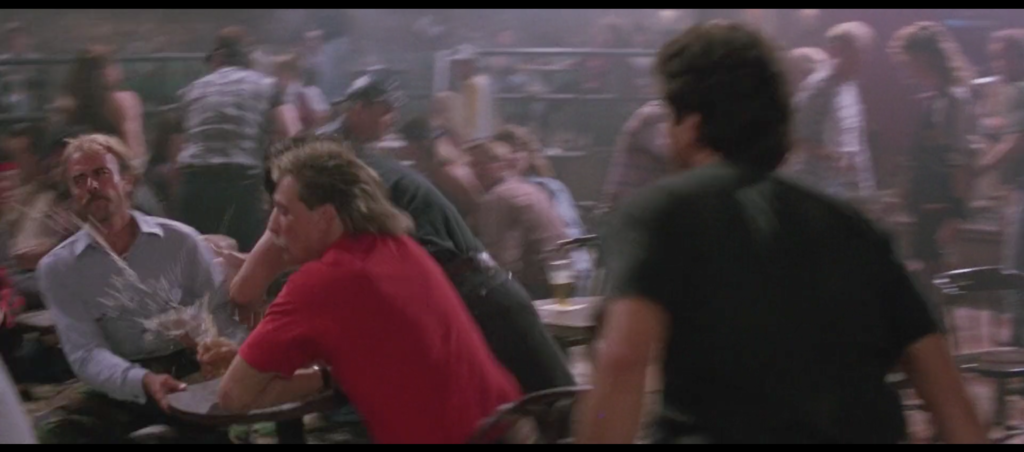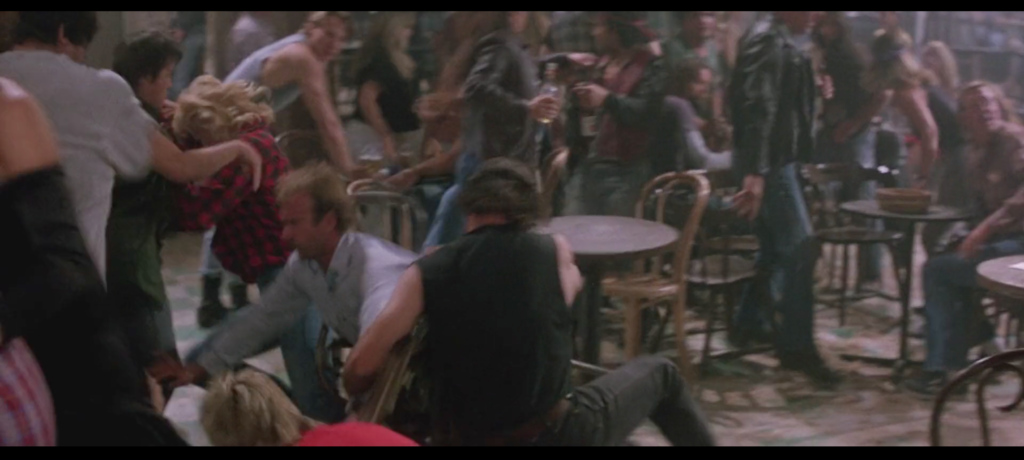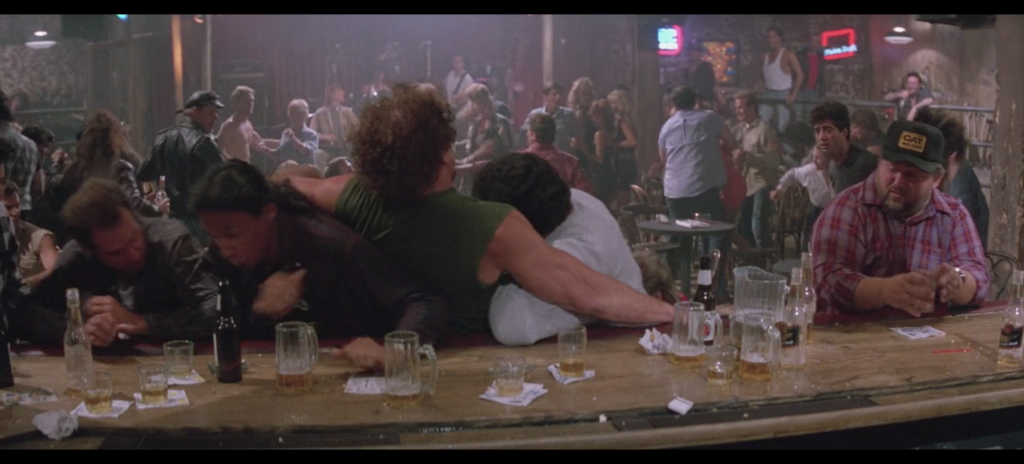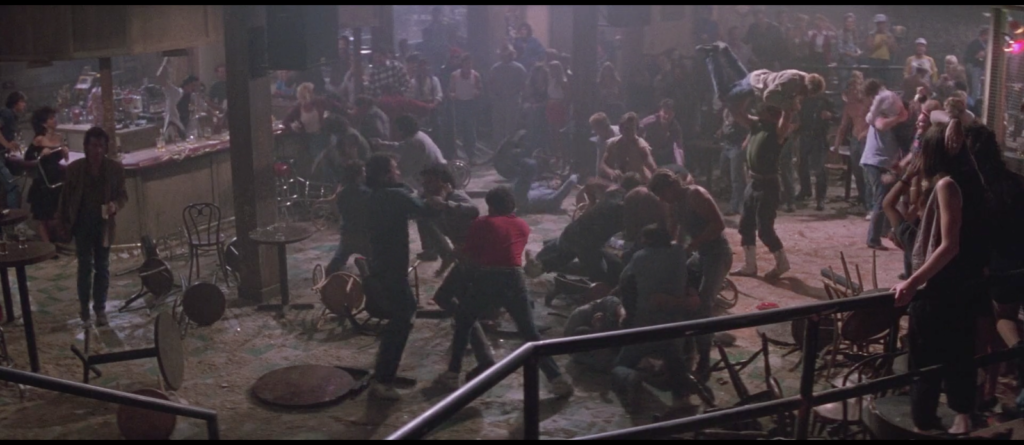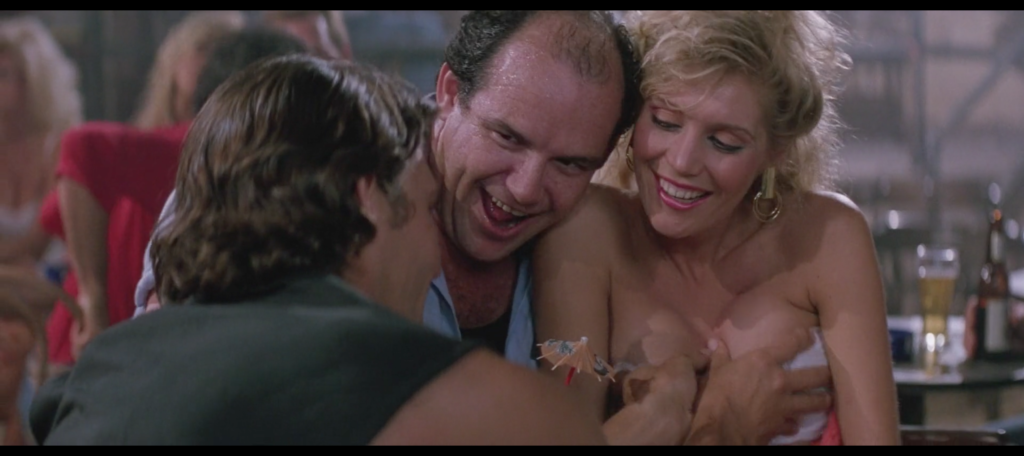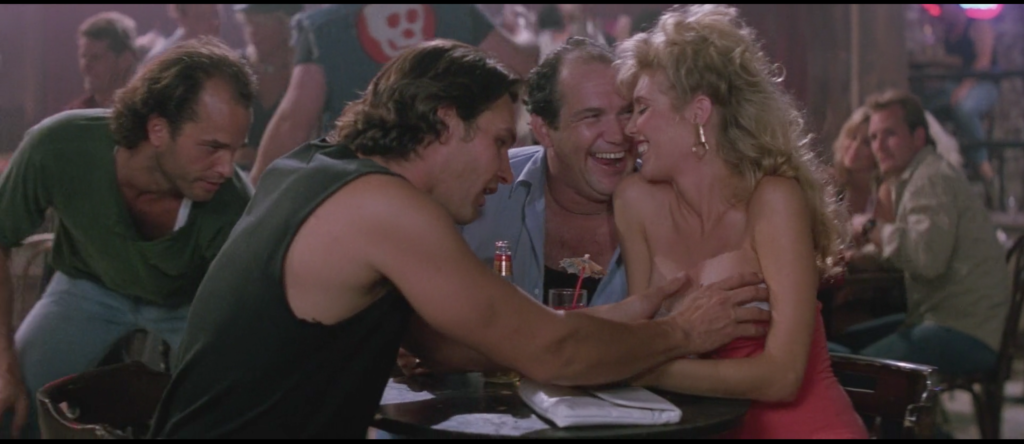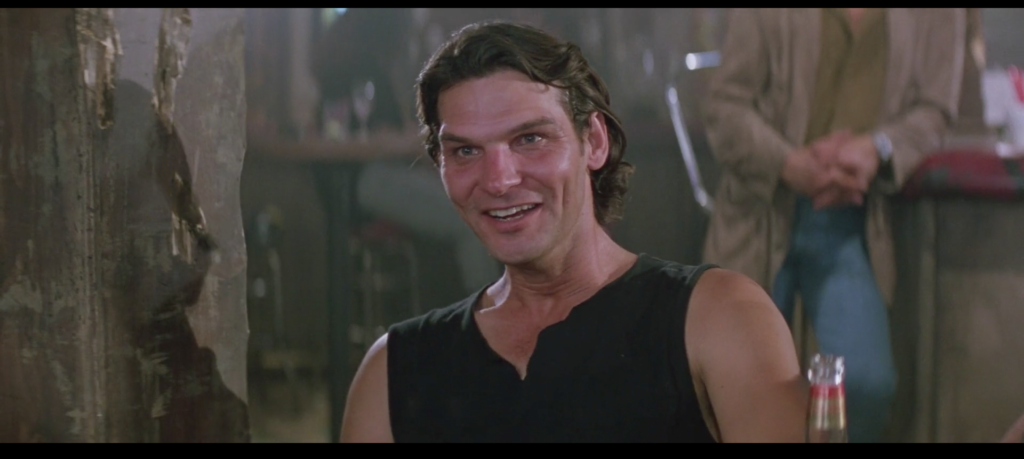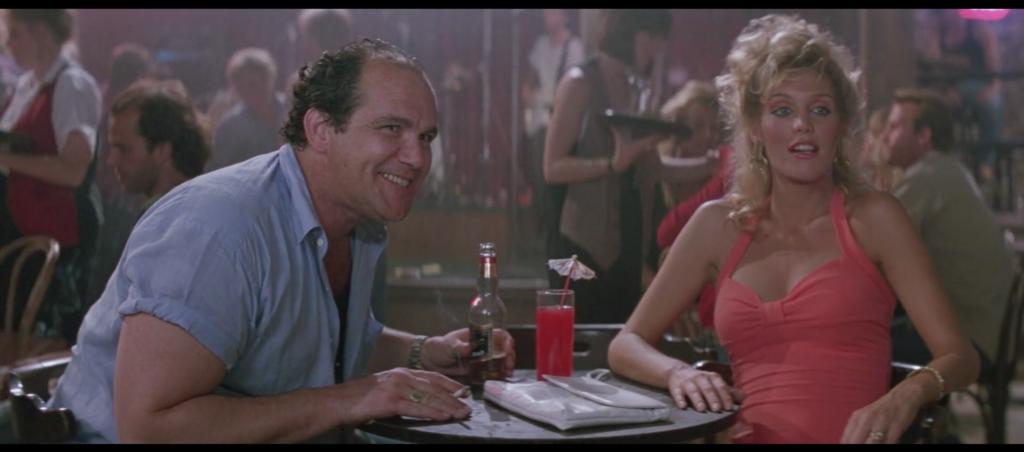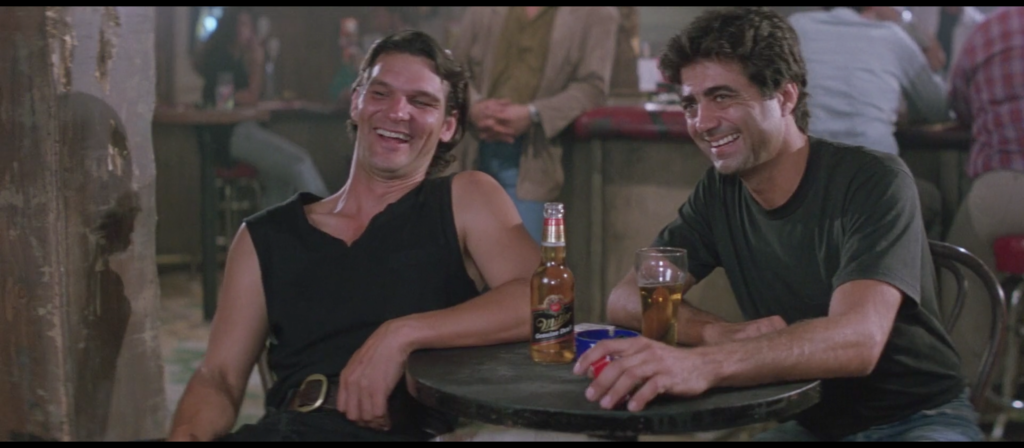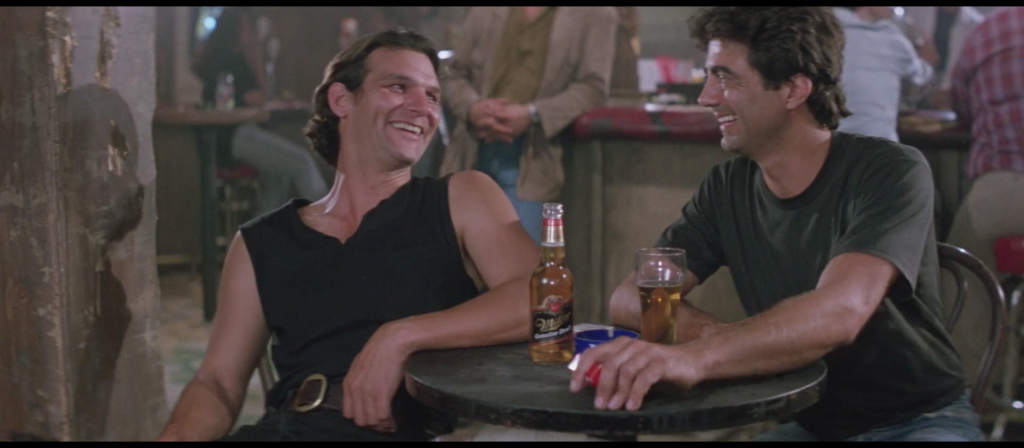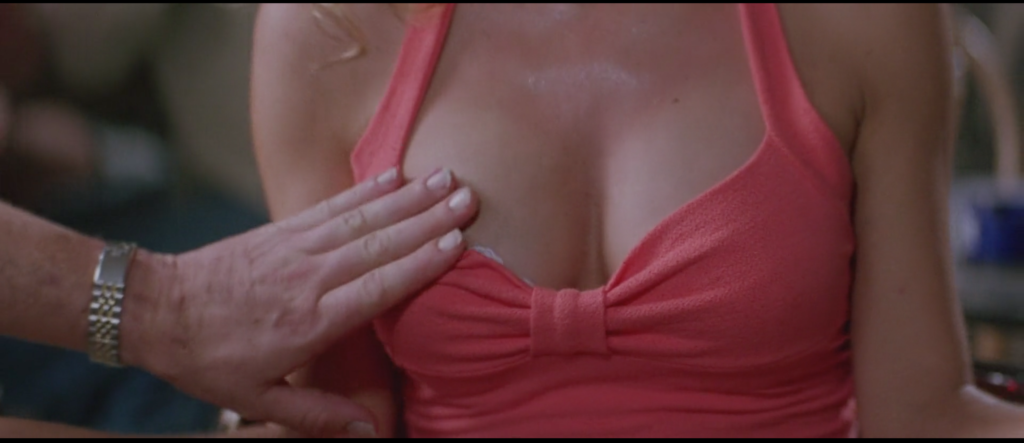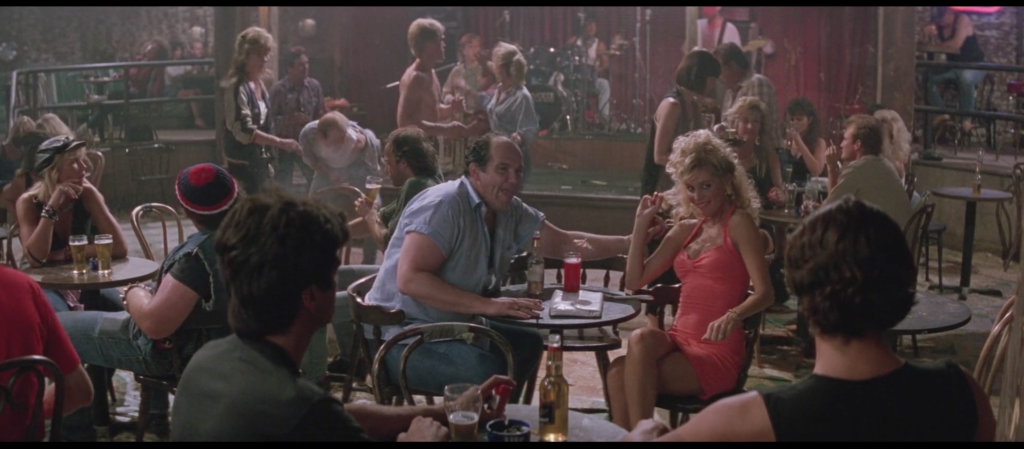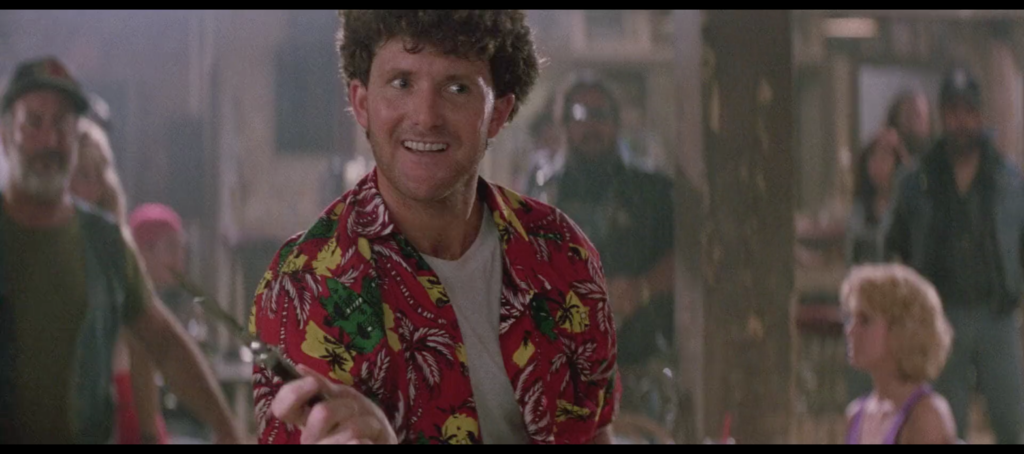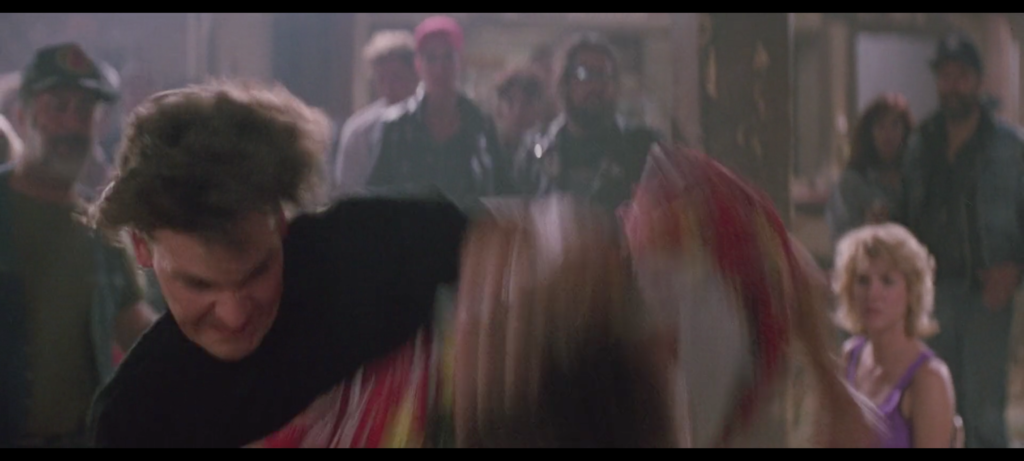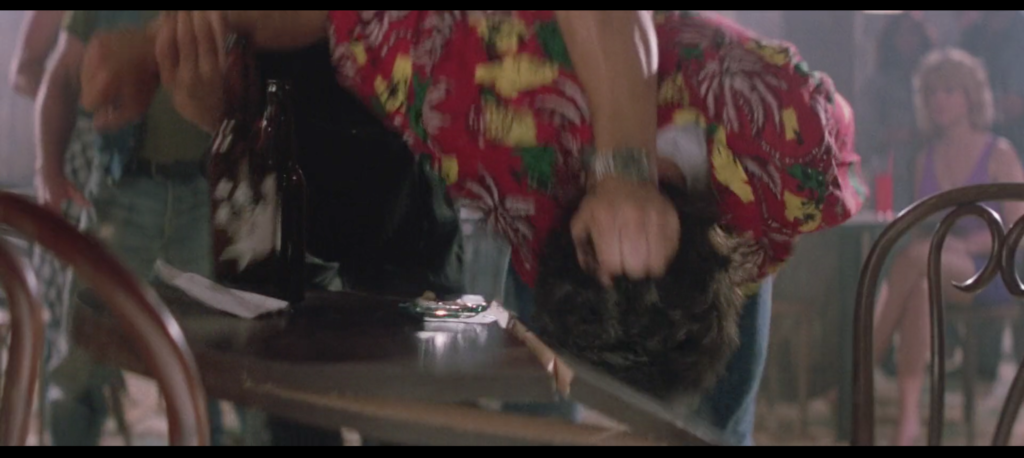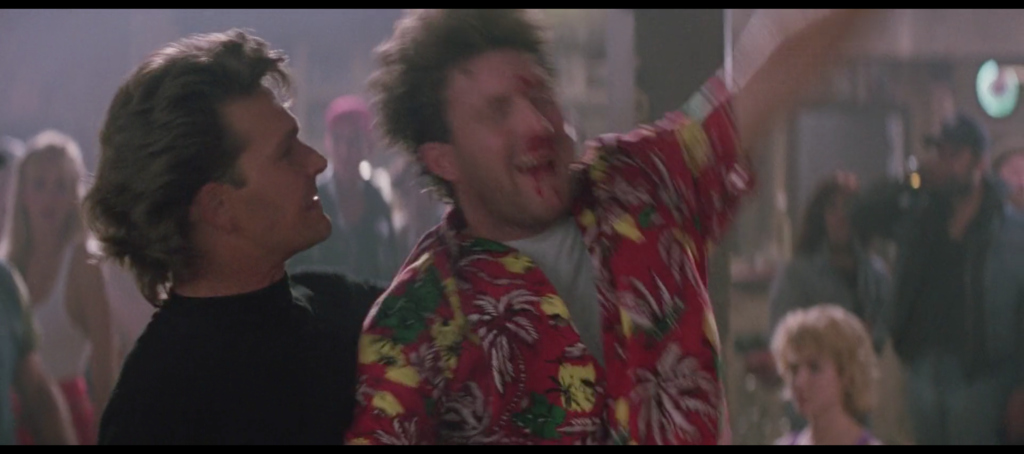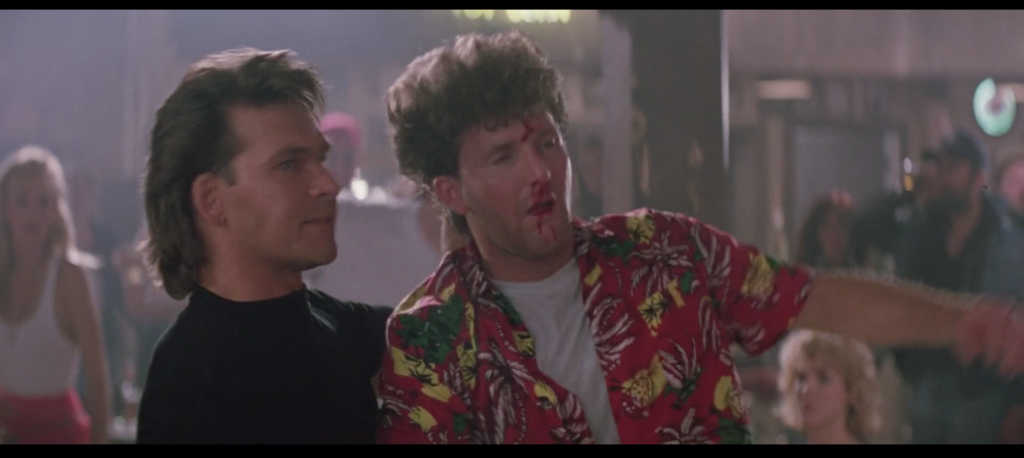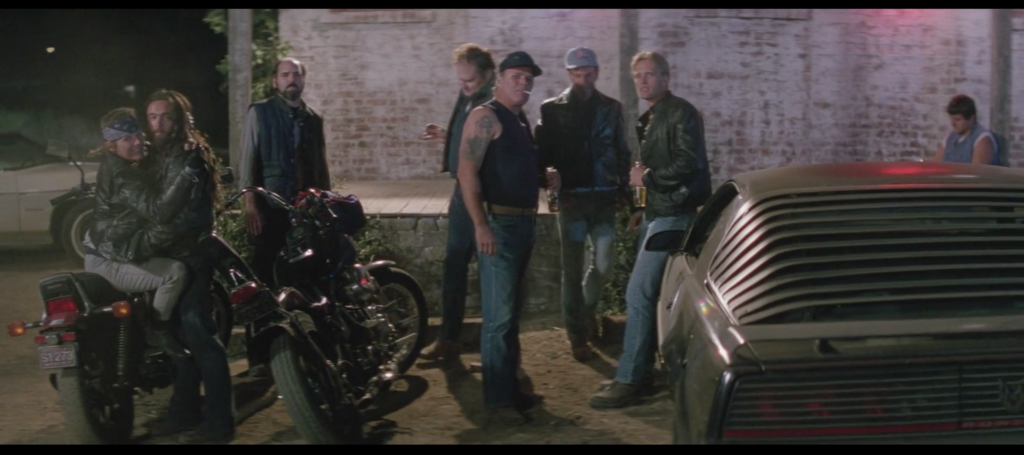After a long night of breaking tables with people’s faces, firing bouncers for fucking teenagers in the storeroom, making Frank Tilghman fire Brad Wesley’s nephew (and I think it’s safe to say his own lover) Pat McGurn, and reading Jim Harrison novels while Wesley and his goons have a topless pool party across the water, Dalton likes to get out of bed hungover without drinking a drop the night before and fully nude in front of his co-worker Carrie Ann, light a cigarette before he finishes buttoning the fly of his jeans, and do some light stretches without even taking the lit cig out of his mouth as she presents him with coffee and a jelly donut or a danish or something. That’s just who he is. That’s just how he (jelly)rolls. The whole little morning ritual we see when Carrie Ann pays him her erotically charged visit is a delight precisely because of the incoherent portrait it paints of this man. He’s constantly smoking even when he’s exercising but he turns up his nose at junk food. His entire method of bouncing depends upon everyone reading everyone else for the slightest cues and clues but he walks around bareassed in front of a woman over whom he has hiring and firing authority, who’s there delivering him food out of the goodness of her own heart. He’s a huge nerd who was up all night reading a book, to the point where he frowns upon some relatively wholesome sex-comedy shenanigans over at Wesley’s place, but when he wakes up it’s like he’s coming off a three-day bender. If you sat and tried to depict the contradictory demands of ideal masculinity—stoic yet vulnerable, wise yet monosyllabic, sexy yet oblivious to his own sexiness, abusing the body he treats as a temple—I don’t know if you could come up with a better illustration than a shirtless Dalton doing his morning stretches while smoking like Dan Aykroyd in Ghostbusters while wearing pants he hasn’t quite finished putting on.
054. The Ballad of Pat & Tilghman
Standing in the bar down in Jasper
Sweeping up the eyeballs for thrills
My bartender’s Pat
Hey, at least I have that
Until when Dalton said he’s skimming the till
Christ, you know it ain’t easy
You know how hard it can be
A man named Brad Wesley
He’s gonna crucify me
Finally found myself with some money
Thought I’d fix the place up just right
Dalton helped me to learn
That my man Pat McGurn
Costs me about a hundred-fifty a night
Christ, you know it ain’t easy
You know how hard it can be
A man named Brad Wesley
He’s gonna crucify me
Pat McGurn’s the son of Brad’s only sister
Canning him’ll take me some nerve
I may own the bar
That only takes me so far
Cuz Mr. Wesley owns the liquor I serve
Christ, you know it ain’t easy
You know how hard it can be
A man named Brad Wesley
He’s gonna crucify me
Wesley takes my money almost every day
“Jasper Improvement Society”
It’s his town he said
Oh boy when he’s dead
The killers will be four men who are old (Tink)
“Take the train, consider it severance”
Pat looks at me raising his brow
Incredulous Pat:
“I didn’t hear you say that”
I stammer “Well, I’m sayin’ it now”
Christ, you know it ain’t easy
You know how hard it can be
A man named Brad Wesley
He’s gonna crucify me
Pat McGurn’s my headcanon lover
Firing him makes me start to pout
His voice is a purr
When he asks “are you sure”
Takes all I have to whisper “get out”
Christ, you know it ain’t easy
You know how hard it can be
A man named Brad Wesley
He’s gonna crucify me
A man named Brad Wesley
He’s gonna crucify me
053. Why We Fight
“This has been, without question, one of the worst weeks of my life, but one man offers succor.” I tweeted this with the above picture a few minutes ago, as I sat down to write today’s Road House essay. I knew exactly what I was going to write about, too. I knew the scene, knew the moment, knew the angle, knew how to flesh it out. It’s one of the ideas that made me want to start this project in the first place. So I’ll get to it, probably soon, and I’ll enjoy it and hopefully you’ll enjoy it as well. But wasn’t until I opened up WordPress in a new tab that I realized the thing I posted on twitter before writing today’s Road House essay is today’s Road House essay.
I’m not going to talk about the week I’ve had, or why it’s been so bad, bad enough that as I type this I am home alone with my stepson instead of out with my partner and our friends because we were supposed to go to an all-sad-songs karaoke party together and I am too sad for Sad Song Karaoke. It’s not really my story to tell anyway. I’ll tell you what is, though: Road House. I don’t think I ever fully understood the concept of “comfort viewing” until Road House came into my life. I don’t think there’s any other film like Road House out there. Viewed communally, which is how I watched it the first time, it’s joy, an invitation to participate in the kind of drunken cinematic mental and verbal horseplay that always makes me think of Ozzy Osbourne saying “eat shit and bark at the moon.” It’s a bark at the moon movie. Viewed in a more intimate setting, with just one or two people who’ve never seen it before, it’s the closest thing to taking a child to an amusement park and seeing a world of delight open up before their eyes, seeing it through their eyes, that I’ve ever found this side taking my daughter to Coney Island for the first time. I have yet to screen this movie for any first-timer who didn’t fall in love with it immediately. Viewed with the person I love it feels like a comfortable couch, a long conversation punctuated by bursts of laughter, the easy romantic camaraderie of talking lightly while getting dressed after sex, a car ride soundtracked by songs we both adore, a hit of Gorilla Glue and a sip of Noah’s Mill, a shared secret, a private joke, a glance that means something to us and no one else. Everyone has these things, but no one has our things; that’s how Road House works. Returned to in isolation day after day, night after night, it has proven to be an inexhaustible source of pleasure and inspiration. This dumbass brilliant movie about a famous bouncer’s duel to the death with an unhinged 7-Eleven franchisee and his army of hapless meatheads for the soul of a town populated exclusively by beautiful blonde women, howling yahoos, and the living embodiments of old man smell is a case study in the rewards of close reading, the powers and boundaries of genre and style, the maxim held close to my heart that the energy of every character in any story can be kinetic rather than potential. At the heart of it all is Dalton, warrior, philosopher, guru, hero, lover, killer, smoker, fighter, fatherless son, living breathing erasure of class distinctions, poet of one-liners and vulgarities, preternaturally calm, childishly petulant, soul of a Blake and body of a Baryshnikov in a world that has made him a gladiator, a prophet and a pusher, partly truth partly fiction, a walking contradiction, played by a beautiful man who once said of the cancer that would go on to kill him “I’m in great condition. I’m a cowboy. I’m a dancer. I’ll beat this.” Every punch in the face, every grotesque insult, every dumb joke, every inexplicable line reading, every grin on Ben Gazzara’s face, every sauntering step Sam Elliott takes, every white-blues song on the soundtrack, every remarkable mutant in the cast, every glimpse of Dalton’s face and hair and chest and ass and credo feels to me to have sprung from the heart of the man that said those words—the cowboy and the dancer who raged against the dying of the light. This has been, without question, one of the worst weeks of my life, but one man offers succor.
052. Boot knife gleam
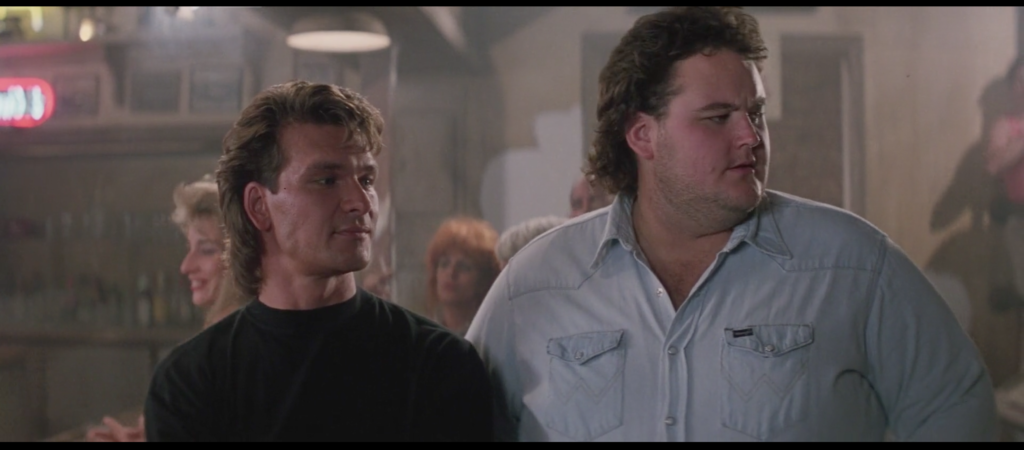
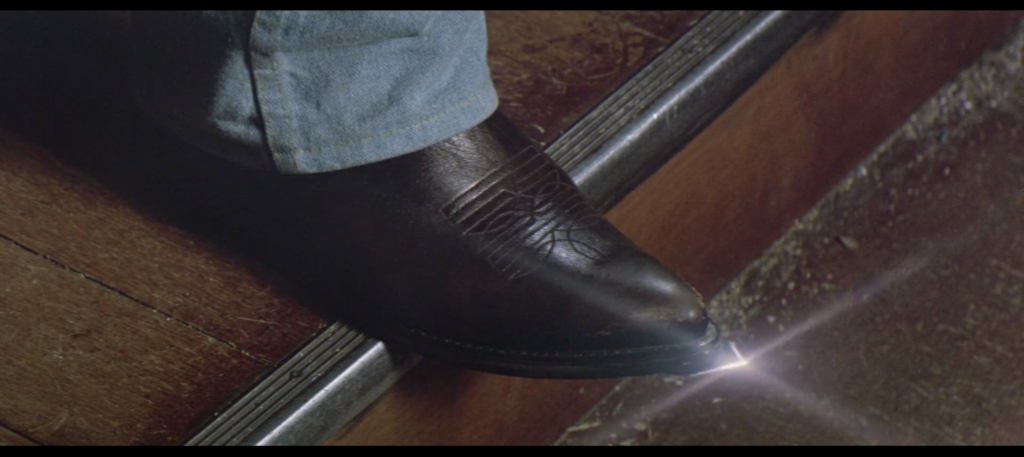
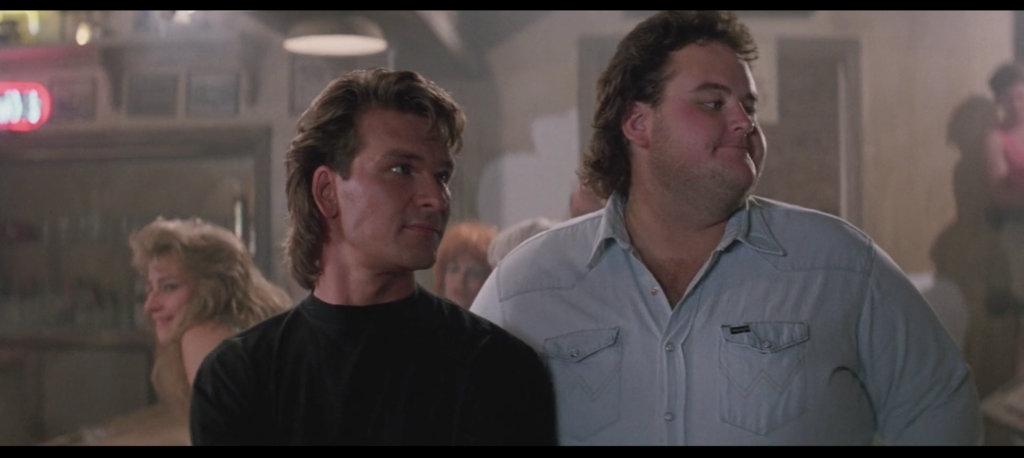
They added a gleam effect to the knife in the boot on the leg of the goon who tries to high-kick Dalton in the head with his knife-mounted boot. Just in case, you know. Even with the closeup—an eyeline match cut from Dalton and his Padawan learner Jack to the boot and then back again (Dalton: “Right boot.” [pause for boot] Jack: “Got it.”)—the audience could have missed it, primarily because even for the kinds of people who might want to watch Road House boot-mounted knives are not the kind of thing you’re trained to spot in the wild. Can’t be too careful, really.
No, really. Let’s review. Never underestimate your opponent. The opponent here is the audience’s inability to recognize a knife sticking out of a Knife Nerd’s shitkicker. Expect the unexpected. You wouldn’t expect someone to miss the knife when it’s one of three things on screen, the other two being the boot and the jeans covering the leg part of the boot, would you? Take it outside. Step beyond the boundaries of yourself and see things through the eyes of others. Never start anything inside the bar unless it’s absolutely necessary. The trouble here started when Brad Wesley, outside the bar, ordered this man to go inside for the express purpose of necessitating violence. Be nice. Dalton’s simply points out the location of the weapon to Jack rather than raising holy hell, a first move echoed when he amasses his bouncers, approaches the boot knife goon with a smile, and simply says the bar is closed. Until it’s time to not be nice. The arrival of the boot knife is the big hand reaching Not Nice O’Clock.
That gleam is not just the light reflected off some jackass’s dopey weapon. It’s Dalton’s bouncer-sense made visible.
The 50 Best Film Scores of All Time
27. John Williams – Star Wars Episode V: The Empire Strikes Back (1980)George Lucas’ Star Wars was an absolute blast—and still is, anytime you’re flipping through channels and catch the Death Star attack run. For the sequel, Lucas and company went a bit deeper, got a bit darker, and added more mystical light and romantic heat. So did Lucas’ go-to composer.Between Jaws, Close Encounters of the Third Kind, Superman, and, of course, that first Star Wars, John Williams was already responsible for some of the most recognizable film music ever recorded, combining a pop musician’s ear for hooks with a sense of scale commensurate with galaxies far, far away. In Empire, he expanded the sonic template he established for the original film, creating his richest and most varied set of compositions yet. Foremost among these is “The Imperial March,” the brassily sinister martial theme associated with Darth Vader. “Yoda’s Theme” is its opposite—soft and sweet, its melody seems to slowly levitate. A swoon in musical form, “Han Solo and the Princess” is an intensely romantic theme for that literally tortured love affair. Empire is the definitive Star Warsscore, featuring songs so intrinsic to Lucas’ fictional universe, it’s hard to believe they weren’t there from the start.
050. The Third Rule
“This is the new Double Deuce,” says Frank Tilghman. We are at the start of an all-hands staff meeting, and Tilghman is pointing to the concept art for the bar’s redesign. But standing nearby is his latest hire, Dalton. It is through Dalton, with Dalton, in Dalton that the new Double Deuce will be achieved. Dalton embodies the new Double Deuce. He is its future.
When Dalton takes over as cooler he becomes more than just the chief bouncer. His role is not to handle a series of discrete incidents, but to institute sweeping reforms that will eliminate such incidents forever. “It’s going to change,” he states—not a threat, not a promise, a fact. His bouncers, too, must change for this to take place. As below, so above.
Bouncing on the Dalton Path is a matter of following “three simple rules.”
This is the third.
3. Be nice.
The three simple rules for bouncing my Jasper road house all contain and account for their own direct contradiction. More than that, they depend on the aspirant’s ability to formulate that contradiction to be fully understood. Thus “Never underestimate your opponent; expect the unexpected” conveys both that chance will always break in the enemy’s favor and that a true brother bouncer—the unmentioned ally in a rule nominally covering the adversary—leaves nothing to chance at all. “Take it outside; never start anything inside the bar unless it’s absolutely necessary” is as much about one’s headspace as it is about one’s physical space, such that participation in a fight that takes place within the building is a requisite condition for obeying the rule in the first place. Even Dalton’s prefatory statement “All you have to do is follow three simple rules” is best thought of through the formulation of the philosopher Linda Richman: They are neither three nor simple nor rules nor followed.
So. The Third Rule. It is the shortest rule, and it requires the most explanation. It is the least practically minded rule, and it is illustrated with the most practical applications. It is a rule about being kind to others, on the surface at least, and it is the rule greeted—and at times delivered—with the most open incredulity, even hostility.
All this is necessary. One must see the complicated clockwork mechanism behind the simplest maxim. One must learn that on the Dalton Path, all philosophy is applied philosophy. One must be goaded into anger to understand the nature and value of its opposite. These things the Third Rule anticipates, mandates, births into being. This simplest of the three simple rules is alone in meriting a fuller and more complex reformulation from the Giver of the Rules, a new testament to unlock the old. It is the Great Commandment. It is not come to destroy, but to fulfil.
3. Be nice…until it’s time to not be nice.
to be continued
The 50 Best Film Soundtracks of All Time
46. Paul Giovanni – The Wicker Man (1973)
The Wicker Man is never what you expect it to be. Like its hero, a Scottish police sergeant trying to find a missing girl in a pagan community, the New York musician Paul Giovanni was a stranger to the old Celtic folkways he was hired to investigate for Robin Hardy’s haunting horror film. His outsider’s ear for both the then-booming British folk scene and its ancient antecedents made the music he composed the ideal mirror for such a twisted journey. The opening song is a tightly harmonized adaptation of Scottish poet Robert Burns’ “The Highland Widow’s Lament,” nearly abrasive in its mournful mountain-air beauty. Sex is a frequent topic for the film and music, rendered in forms both profane (the absolutely filthy drinking song “The Landlord’s Daughter”) and sacred (“Willow’s Song,” the set’s dirty-minded but gorgeous standout). Rousing community singalongs and sparse hymns of ritual sacrifice weave conflicting narratives of their own. It’s a soundtrack that casts strange shadows and remains ungraspable, like a tongue of flame.
049. Jimmy, or The Laugh
It’s not all fun and games. No, it’s not all fun and games. We joke here at Pain Don’t Hurt, we laugh here, because Road House is a fun and often (nearly always) funny movie. But the Dalton Path leads inexorably toward darker days and nights.
This is Jimmy, Brad Wesley’s right-hand man, chief enforcer, and bastard son. (Non-canonically.) We’ve met him before during the nearly fifty days I’ve been writing about Road House, but he has remained a liminal presence, his dark eyes and blue denim looming in the background like a pale man at a party in a David Lynch film. He accompanies Wesley to Red Webster’s store for their weekly payout but doesn’t say a word. He drives Karpis (unnamed handsome man, in the parlance of the film itself) to fuck the store up later on but never gets out of the car. He laughs as Wesley beats O’Connor for bleeding too much but never throws a punch. He scoffs at Dalton and the Doc as he and Ketchum (the other unnamed goon) spy on them but doesn’t make a move.
It’s at the precise moment when Jimmy is finally set loose, battling Wade Garrett and the entire Dalton-led bouncing staff of the Double Deuce after Dalton cruelly shuts down Denise’s Wesley-approved antagonistic striptease (?!), that things go bad.
Brad Wesley, who moves through life grinning wryly at virtually everyone and everything he sees, has taught his boys well. All of them, even Tinker, have learned to laugh at the misfortune of others, and at nothing else. But Jimmy is Brad’s best boy, and his is the deepest laugh, the fullest laugh, the loudest, the longest—and the last.
Jimmy emits this piercing and preposterous peal—the supervillain laugh to end them all—after blowing up the shack where Dalton’s landlord Emmett lives (and, judging from the size of the explosion, cooks meth) in the middle of the night. So delighted is he by the night’s mean work that he actually stops his getaway motorcycle to look back, take in the extent of what he has done, and enjoy the moment to its fullest. He laughs like a man not acquainted with the concept in any context where the smell of blood and cordite is not on the night wind.
In this moment, Jimmy exhausts the good humor of the Wesleyan Goons with one titanic cackle of pure, joyous malice. No longer are they the cocky cut-ups who run over car dealerships with monster trucks or get beat up in bars. From here on out they exist to kill. Jimmy inhales horseplay and exhales murder. And Dalton is the man who breathes that fire back in.
True Detective Season 3 Is Twin Peaks’ True Heir
True Detective season three is about the fate of the Purcell children, yes. But it’s also about the prejudice and PTSD that drove Native American Vietnam vet Brett Woodard to spark a lethal firefight after his neighbors tried to lynch him for a crime he didn’t commit. It’s about the mysterious one-eyed man who gave the Purcell kids a doll he purchased from a racist parishioner at the local Catholic church, then resurfaced a decade later to harangue Amelia for profiting off other people’s suffering. It’s about the black neighborhood that understandably reacts to a visit from the police like an invasion by outside occupiers. It’s about the three random metalhead teenage assholes who nearly get jammed up for murder because they’re surly and wear Black Sabbath shirts in a God-fearing southern community. It’s about Tom Purcell, driven to alcoholism to dull the pain of life in the closet. It’s about his wife, Lucy, who employs drugs, drink, and promiscuity in much the same self-medicating way after a childhood of abuse and incest. It’s about the contemporary true-crime boom, and how well-meaning filmmakers and podcasters and writers can get us closer to the truth but do a lot of damage on their way there. It’s about the way wealthy men and their allies in government and law enforcement can collude to treat the communities they rule with the kind of impunity that would make a feudal lord envious. It’s about an old man with Alzheimer’s, whose own life is fast becoming as big a mystery to him as the case he could never quite solve, and whose loved ones are slowly slipping into anonymity the same way the real killers and kidnappers did.
In this respect, True Detective season threehas learned lessons not only from its own direct predecessors, but from the ne plus ultra of small-town murder mystery television: Twin Peaks. And it’s learned the right lessons, too.
039. Biker Gang
The very first people to give Dalton shit upon his arrival in Jasper aren’t Brad Wesley and his goons. They aren’t the corrupt members of the Double Deuce’s staff. They aren’t even Knife Nerds or other random ne’er-do-wells among the club’s clientele. They’re a biker gang, in the Double Deuce’s parking lot. “Mer-SAY-dees!” they whoop it up as Dalton parks his luxury work of German engineering in the unpaved unloading zone for the town’s worst element, glaring at him all the while. “Hey hotshot! What’s wrong with Dee-troit cars?” Dalton simply stares back at them and their bikes and their very cool ’80s bad-guy car, tosses away his cigarette, and goes about his business. You and I are left with more to ponder.
At first blush it’s just a bit of color, a way to convey that the Double Deuce is a rough and tumble environment before you so much as step through the doors, in the same way that watching Morgan the evil bouncer toss a guy through those doors a few seconds later (“Don’t come back, peckerhead!”) lets you know what you’re in for once you set foot inside. What makes it a uniquely Road House bit of color how none of it has the slightest relevance at any point in the future, and how no element of it is ever heard from again.
Are biker gangs a threat Dalton will face in his quest to clean up the Double Deuce, and eventually the entire town of Jasper? No. Not even a little bit, in fact. The problems all stem from Brad Wesley, the Fotomat King, and his merry band of assholes. This is Road House, not The Road Warrior. Though Dalton and Brad Wesley could well be the Mad Max and Lord Humungus of the post-guzzoline Missouri wastelands should it come to that, this is merely informed speculation.
Is there a slobs vs. snobs angle to the movie? Again, no. For one thing Dalton always stows away his fancy car and uses a ringer instead once he starts working, so he doesn’t even bring the Mercedes back to the Double Deuce, or anywhere else for that matter, until the end of the film. He doesn’t ostentatiously spend his money, or wow the local yokels with his citified ways, or even crow about his NYU philosophy degree to woo Dr. Elizabeth Clay. What’s wrong with Dee-troit cars? Nothing, as far as he’s concerned. (This is a question better directed at Brad Wesley.)
Maybe these guys play a role in the ensuing all-hands-on-deck barfight, the movie’s first? Once again, no. The instigators and all the primary combatants are just the usual drunken shitbirds and meatheads. While it is true that one of the bikers miraculously appears inside as the Shirtless Man about twenty seconds later, this is down to Road House‘s charmingly free-form approach to continuity, rather than the idea that this guy somehow raced around to a back entrance, bared his chest, and started boogying down in the time it took Dalton to cross the parking lot and enter from the front. The Shirtless Man, at any rate, is a dancer, not a fighter.
But in their own pointless way, the bikers illustrate the importance of Dalton’s First Rule: “Never underestimate your opponent. Expect the unexpected.” Your enemies could look like anyone, come from anywhere, and attack at any time, even if their offense consists solely of “Buy American” jingoism. A cooler of Dalton’s experience and skill would have devised a plan for combatting these creeps within seconds, and likely kept it filed away throughout the course of the film, in case Brad Wesley ever hired them to run his clunker off the road, or prevent him from accessing one of Jasper’s many auto and auto-parts dealerships—or, less facetiously, bring the fight to grizzled old road dog Wade Garrett before he so much as parks his motorcycle. Indeed, one could argue that Dalton’s purchase of a beat-up car to replace his Mercedes was his way of defeating these opponents by depriving them of their casus belli. Victory is his before battle is joined.

